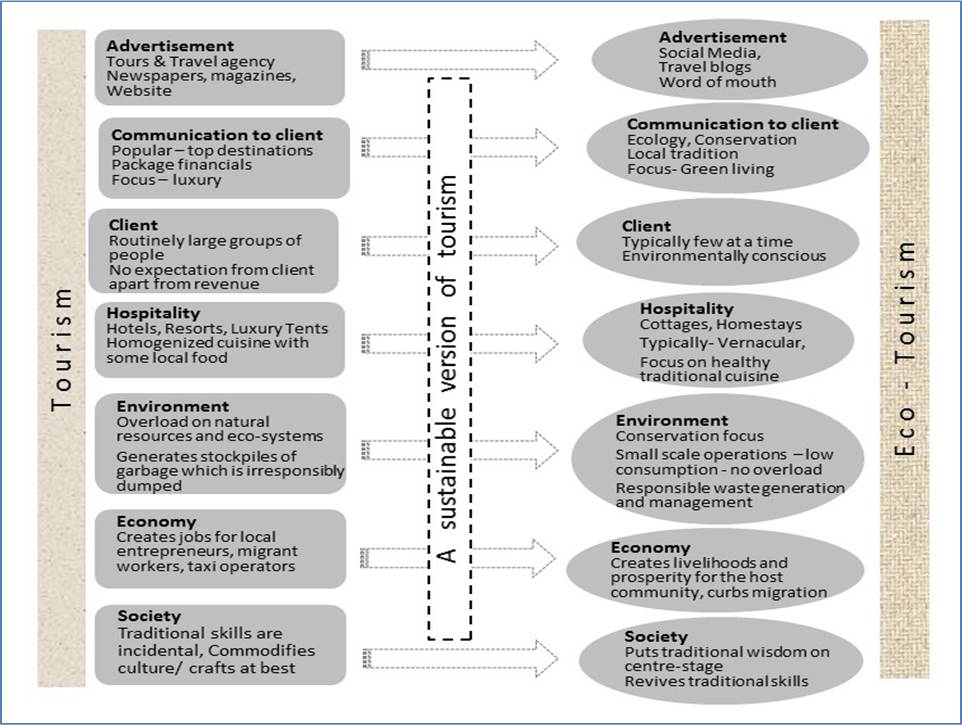|
The Mountain Echo of Eco-Tourism
Mountain - the word instantly conjures a feeling of goodness and well-being. Mountain tourism, simply by virtue of the ‘mountain’, has the potential to make tourism a much more wholesome experience. It holds promise of unforgettable experiences for all kinds of travellers. Spectacular treks and mountaineering challenges for the adventure seekers. Temples in uniquely spiritual settings for the religious-minded. Or simply a rejuvenating pause for urban folk to wash away the grind and grime of daily life. However, it can also be limited to travel to a popular place, with its familiar tropes of sight-seeing en-masse and formula hospitality, irrespective of the ‘mountain’ destination. By default, tourism acquires great economic significance for mountain areas where regular avenues of development remain limited because of geographical and demographic constraints. While the tourist and service providers continue to be engaged in an economic relationship, the larger impacts of this economic activity have mostly been taken for granted which ultimately proves to be unsustainable for the activity itself. Most notably, these impacts relate to environmental damage caused to the fragile mountain eco-systems, over-exploitation of resources and socio-cultural shifts among the local community. Concept of eco-tourism It goes without saying that tourism, the way it is practiced today, needs to wake up to its adverse impacts and take steps to protect the very assets that are its foundation. Eco-tourism is a sub-set of tourism which arises out of this concern. As a movement, eco-tourism began to take shape in the 1980s where it was defined as ‘tourism to areas of ecological interest (typically exotic and often threatened natural environments), especially to support conservation efforts and observe wildlife; so as to have the least possible adverse effect.’ Over the years, the concept of eco-tourism has expanded beyond nature-conservation. Centre for Responsible Travel (CREST), defines eco-tourism as, ‘Responsible travel to natural areas that conserves the environment, socially and economically sustains the well-being of local people, and creates knowledge and understanding through interpretation and education of all involved (including staff, travelers and community residents).’ Because eco-tourism principles generally apply to areas where natural eco-systems are fragile, these initiatives are largely located in regions where rural communities provide the essential services. It is important therefore to make the distinction that, apart from positive impacts on ecology, eco-tourism must also create concrete financial benefits for the host rural communities.
Eco-tourism in mountain areas The application of eco-tourism in mountainous regions creates a win-win scenario. While on one hand, it offers an experience of living lightly to the traveller, on the other, it is a genuine driver for socio-economic transformation of communities living in far-flung areas. The latter is perhaps the greater cause of eco-tourism. Lack of employment opportunities for the young is a critical issue in sustainable mountain development. The more than 700 ‘ghost villages’ of Uttarakhand where close to 1.2 lakh people have left their homes in search of livelihoods, is testament to this issue. Eco-tourism creates a dependable income-generating mechanism for rural youth which is rooted in their environment and lifestyle and draws upon local resources. This will in-turn trigger improvement of basic facilities in health and education. It creates a genuine platform for traditional knowledge, skills and craft to be documented and propagated. It also offers the best incentive for responsible management of solid waste which is one of the most visible fall-outs of tourism today. ■
Pankaj Khanna
|
